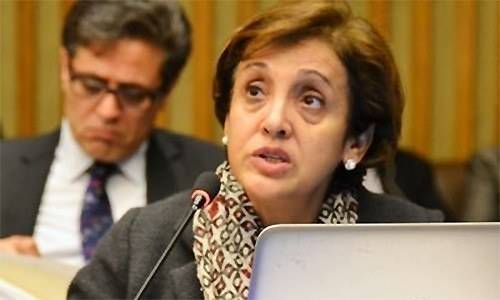The Foreign Office on Saturday summoned Myanmar’s ambassador to Pakistan U Win Myint and registered its strong protest over the ongoing violence against the Rohingya Muslims.
Foreign Secretary Tehmina Janjua conveyed a strong protest of the government and people of Pakistan at the ongoing violence against the Rohingya Muslims in the Rakhine State in Myanmar.
The foreign secretary called for effective measures to prevent the recurrence of such violence, providing security to Rohingya Muslims, and upholding their rights to live and move without fear and discrimination.
Janjua communicated to the Myanmar envoy the need of urgent investigations into recent violence against the Rohingya Muslims and accountability of those responsible for the serious crimes.
The foreign secretary also emphasised on the swift implementation of the recommendations of the Kofi Annan Commission that include urgent and sustained action to prevent violence, maintain peace, foster reconciliation, assure unhindered humanitarian access, and address the issue of citizenship as part of a durable settlement of the problem.
The Myanmar ambassador assured Janjua that the Pakistani government and nation’s message and concerns will be conveyed to the Myanmar government.
Around 270,000 Rohingya Muslims have fled since August 25 when militant attacks sent unrest churning through Rakhine, arriving in Bangladesh hungry and exhausted and squashing into already overcrowded refugee camps.
Tens of thousands more are believed to be on the move inside Rakhine, fleeing burning villages, the army and ethnic Rakhine mobs — who Rohingya refugees accuse of attacking civilians — only to become stranded in hills without food, water, shelter or medical care.
Branded 'Bengalis' — shorthand for illegal immigrants from Bangladesh — the Rohingya have long been subjected to discrimination in mostly Buddhist Myanmar.
More than 350,000 have fled since October when a new Rohingya militant group launched attacks on police posts. That represents around a third of the estimated total of Rohingya in Myanmar.
Around 120,000 have languished in basic displaced camps following religious violence in 2012, while the rest are subject to suffocating restrictions on their movement and rights to work.
Yanghee Lee, the UN special rapporteur on human rights in Myanmar, on Friday said over a thousand people may have been killed in the subsequent army crackdown, the majority likely to be Rohingya.
In an interview with AFP she said Myanmar's star politician Aung San Suu Kyi, a fearless democracy campaigner under the former junta, had failed to use her moral authority to defend the Rohingya.
"I think we need to delete our memories of the imprisoned democratic icon," Lee said, explaining that Suu Kyi was now a politician, not a rights defender.
The Nobel Peace Prize winner has been condemned for her refusal to bend to pressure and speak out for the Rohingya including by Suu fellow Nobel laureates Malala Yousafzai and Archbishop Desmond Tutu.






